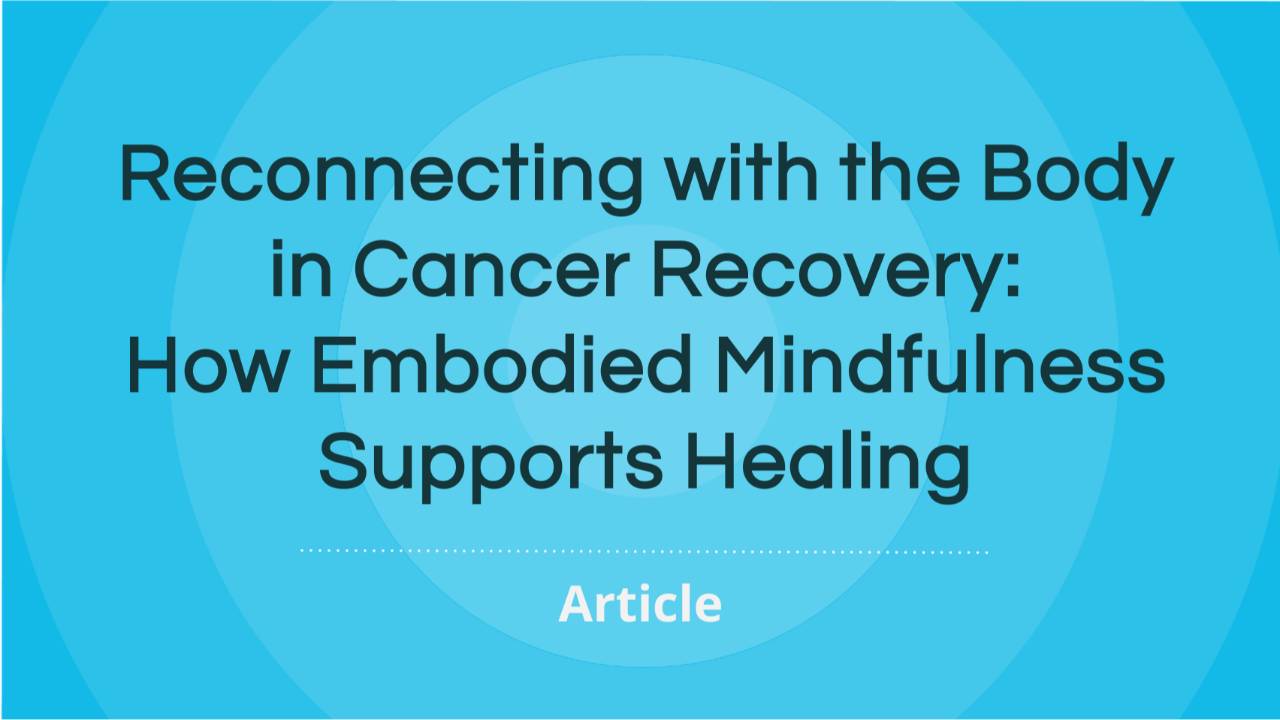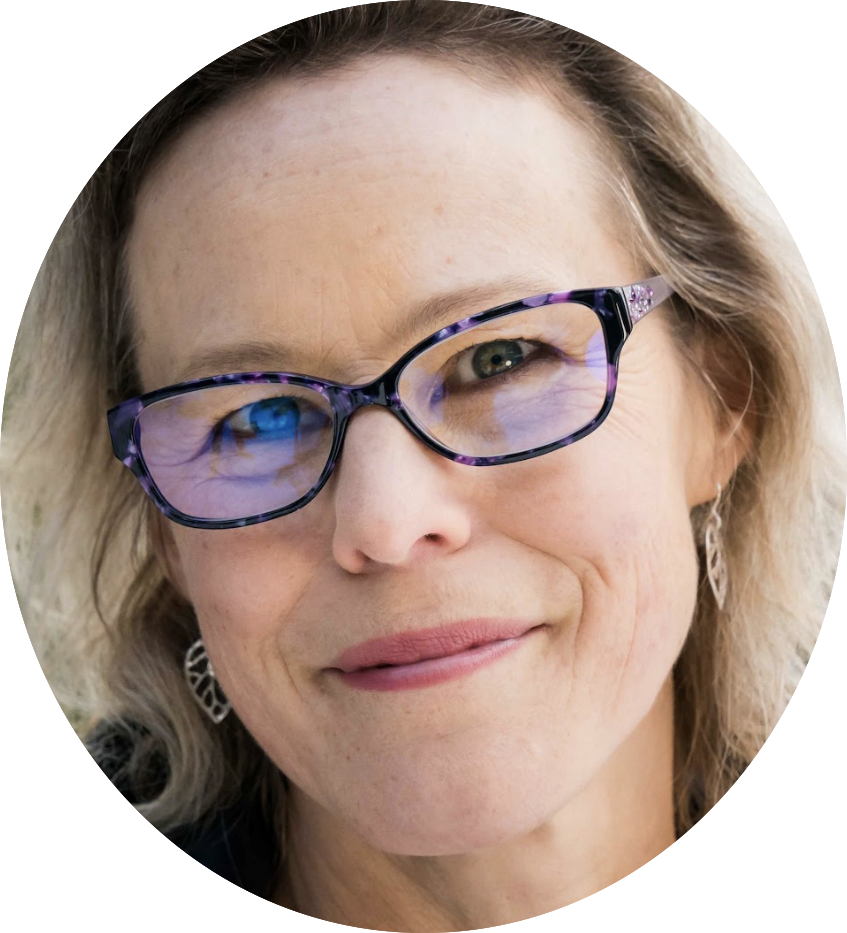Reconnecting with the Body in Cancer Recovery: How Embodied Mindfulness Supports Healing
Jun 13, 2025
This article offers practical, research-informed insights into how embodied mindfulness can help individuals recovering from cancer rebuild trust in their bodies, process difficult emotions, and reclaim a sense of agency and meaning.
A cancer diagnosis can unravel the fabric of life as we know it—physically, emotionally, and existentially. Whether in treatment or navigating survivorship, many individuals experience a profound disconnection from their bodies. They may feel betrayed by a body that became ill despite their care—one that now no longer looks or functions as it once did. The very ground of identity—roles, capacities, appearance, autonomy—can feel shaken. And yet, within this upheaval lies the possibility of healing: not by returning to “normal,” but by cultivating a new, compassionate relationship with the self.
“People don’t go back to the way they were before—and often that’s a good thing. There’s a changed relationship to oneself and one’s body.” — Dr. Linda Carlson
Dr. Linda Carlson, Ph.D., R.Psych., clinical psychologist, professor, internationally recognized researcher and co-developer of the Mindfulness-Based Cancer Recovery (MBCR) program, invites people to approach these questions not by striving to “get back to normal,” but by gently cultivating presence, kindness, and embodied self-awareness. In our on-demand workshop, Embodied Mindfulness Practices to Support Cancer Recovery and Survivorship, Dr. Carlson guides helping professionals in integrating trauma-sensitive, research-based mindfulness tools that empower clients to rebuild connection with their bodies after cancer.
In this article, written in collaboration with Dr. Carlson, we’ll explore how cancer and its treatment can disrupt the mind-body connection, and how embodied mindfulness can support individuals recovering from cancer—helping them navigate emotional and physical challenges, relate to their bodies with kindness, and live with greater agency and meaning.
Contents:
- The Body as Stranger: Disruption and Disconnection
- What Healing Really Means: Embracing Change with Compassion
- Embodied Mindfulness: Awareness and Presence as Pathways to Trust
- Core Attitudes of Mindfulness in Cancer Recovery
- Practical Ways to Support Cancer Recovery Through Embodied Mindfulness
The Body as Stranger: Disruption and Disconnection
Cancer and its treatment often change how people perceive their bodies. Surgical scars, hair loss, fatigue, nausea, insomnia, and pain can lead to resentment, grief, or a sense of betrayal. As one participant in Dr. Carlson’s MBCR group poignantly expressed, “How do I live in a body that doesn’t feel like mine anymore?”
This disconnection isn’t just physical—it’s emotional and spiritual. It challenges core aspects of identity, including the roles we hold, our sense of agency, and even how we relate to life itself. In a culture that prizes positivity and control, people may feel pressure to “bounce back” or maintain a facade of optimism while internally struggling with loss, fear, and fatigue.
Mindfulness offers another way forward: a path of turning toward the body, not away from it, and meeting one’s experience with curiosity, kindness, and acceptance.
What Healing Really Means: Embracing Change with Compassion
Healing in the context of cancer isn’t about going back to who we were before diagnosis. Rather, it’s about developing a new relationship with ourselves—one that acknowledges what has been lost, but also what is still possible.
This reframing helps individuals move from striving and judgment toward self-compassion and presence. As Dr. Linda Carlson emphasizes in her MBCR program, healing is not about fixing the body or returning to a former version of the self—it’s about “meeting the body as it is, with acceptance.” Through gentle awareness and embodied practice, participants are invited to reconnect with themselves as they are now, creating space for both grief and gratitude, loss and resilience.
By accepting the body as it is—people begin to feel more at home in themselves. This compassionate reconnection fosters greater ease, agency, and meaning, even in the face of uncertainty.
Embodied Mindfulness: Awareness and Presence as Pathways to Trust
Reconnecting with the body begins with awareness. MBCR practices, such as the body scan and gentle mindful movement, are designed to meet the body with sensitivity and care. These are not performance-based exercises. Rather, they are invitations to explore what’s present—tension, ease, discomfort, numbness—with openness and respect.
This embodied approach is especially powerful in cancer recovery for several reasons:
-
Cultivating Familiarity: Through repeated, gentle attention to the body, participants regain a sense of familiarity and trust in their physical sensations, which is essential for distinguishing between normal discomfort and symptoms of concern. This growing awareness fosters a renewed trust in the body’s signals, helping participants better distinguish between everyday discomfort and sensations that may need attention.
-
Meeting Anxiety with Awareness: Mindfulness helps calm the mind’s tendency to race into catastrophic “what ifs.” Instead, individuals learn to anchor themselves in the present moment and acknowledge their fears with honesty and compassion. This practice doesn’t eliminate anxiety, but it softens its grip. Instead of being stuck in a loop of catastrophic thinking or future-focused rumination, individuals gain tools to hold their experience with clarity and self-kindness.
-
Fostering Emotional Resilience: Embodied presence creates a safe space for difficult emotions to arise and be processed. As Dr. Carlson explains, mindfulness is not about “thinking positive”; in fact, many participants feel pressured by others to stay upbeat, even when they are grieving or afraid. Instead, it offers permission to feel the full range of emotion: grief, anger, fear, and even moments of peace. This compassionate approach allows individuals to process their experience without judgment and to move through it with greater integrity and resilience.
-
Empowering Self-Agency: By making personal choices in how they move, breathe, and respond, participants reclaim a sense of control—an antidote to the helplessness that often accompanies illness.
Core Attitudes of Mindfulness in Cancer Recovery
MBCR is grounded in core attitudes of mindfulness that shape how individuals relate to themselves and their experience. While not exhaustive, the following qualities offer powerful starting points for those navigating life after a cancer diagnosis:
- Non-Striving: Letting go of the pressure to fix, improve, or return to who you were “before.”
- Acceptance: Meeting reality as it is, even when it’s painful, uncertain or unwanted. This doesn’t mean liking what’s happening—it means making space for it. From “why me?” to “Why not me?” to “Here I am”
- Self-Compassion: Relating to the self with warmth and gentleness. Acknowledging suffering without adding layers or judgment.
- Curiosity and Beginner’s Mind: Approaching each moment - sensation, emotion, or breath - with openness and a willingness to see things anew—especially in a body that feels different or unfamiliar.
- Letting Go: Releasing what cannot be controlled. Rather than gripping tightly to how things should be, this attitude invites softening into what is, moment by moment.
These attitudes are not abstract ideals; they are lived practices that can support a shift from resistance to resilience, from disconnection to integration, and from surviving to living with greater presence and intention.
Practical Ways to Support Cancer Recovery Through Embodied Mindfulness
For professionals supporting people with cancer—and for individuals navigating recovery—here are a few actionable ways to integrate embodied mindfulness:
- Offer Guided Body Scans: Begin with short, seated or lying-down body scans that emphasize awareness over change. Invite participants to notice areas of tension, pain, or numbness with kindness.
- Adapt Movement Practices: Use gentle, breath-coordinated movement (e.g., simple arm stretches) with options to visualize rather than perform. Always offer choice and emphasize listening to the body.
- Normalize Grief and Vulnerability: Create spaces where people can acknowledge loss—of function, appearance, roles—without needing to “stay positive.”
- Invite Personal Reflection: Ask participants how mindfulness can help them relate differently to their bodies, emotions, and lives. Highlight shared experiences and insights.
- Emphasize Connection: Whether in group settings or one-on-one, encourage shared storytelling and peer support. This helps people feel less alone and more understood.
Cancer disrupts life’s rhythms, reshapes identity, and demands a recalibration of what it means to live well. Embodied mindfulness offers a gentle, grounded way to reconnect with the body—not as a project to fix, but as a partner in healing.
By meeting the body with awareness and compassion, we open the door to a deeper kind of recovery—one rooted in presence, meaning, and a profound trust in our capacity to heal.
Interested in learning more? Gain deeper insights into mindfully supporting clients with cancer through our comprehensive, practice-based resources included in our on-demand workshop: Embodied Mindfulness Practices to Support Cancer Recovery and Survivorship.
Access the Seated Body Scan & Mindful Movement Practice for Embodied Awareness, plus practical tools to adapting mindfulness practices for the lived experience of cancer. You'll also receive three high-definition video lessons with professional transcripts—offering valuable insights to support others in refriending their body, included with our 14-day free trial membership.
Feel free to share this post with friends, family, or colleagues. Thanks for your ongoing interest and support!

Dr. Linda E. Carlson, Ph.D., R.Psych., is a clinical psychologist, professor and internationally recognized researcher. Dr. Carlson has authored over 250 publications and co-developed the Mindfulness-Based Cancer Recovery (MBCR) program. She has held the Enbridge Research Chair in Psychosocial Oncology since 2007, directs the Alberta Complementary Therapy and Integrative Oncology (ACTION) Centre and formerly served as President of the Society for Integrative Oncology.

Sarah Kraftchuk, MSc, RP (qualifying), is Head of Learning at the Mindful Institute. She is a licensed clinician, certified mindfulness facilitator, art therapist, and children’s book author.

Michael Apollo MHSc RP, is a licensed clinician, mindfulness educator, and Founder of the Mindful Institute. With over 15 years of experience, he specializes in practical, evidence-based mindfulness training for helping professionals. Formerly Director of Mindfulness Programs at the University of Toronto, Michael has collaborated with organizations like the World Health Organization, the UK NHS, and the Canadian Parliament to support mental well-being and resilience in diverse settings.
References
Carlson, L. E., & Speca, M. (2010). Mindfulness-based cancer recovery: A step-by-step MBSR approach to help you cope with treatment and reclaim your life. New Harbinger Publications.
Carlson LE. (2022) Psychosocial and Integrative Oncology: Interventions Across the Disease Trajectory. Annual Review Psychology. 2022 Sep 14. doi: 10.1146/annurev-psych-032620-031757. https://doi.org/10.1146/annurev-psych-032620-031757
Cohen, L., & Jefferies, A. (with contributions from Alison Jefferies). (2018). Anticancer living: Transform your life and health with the mix of six. Viking.
Kabat-Zinn, J. (1990). Full catastrophe living: Using the wisdom of your body and mind to face stress, pain, and illness. Delacorte Press.
Shapiro, S. L., & Carlson, L. E. (2017). The art and science of mindfulness: Integrating mindfulness into psychology and the helping professions (2nd ed.). American Psychological Association. https://doi.org/10.1037/0000022-000
Gentile D, Beeler D, Wang XS, Ben-Arye E, Zick S, Bao T, Carlson LE, Ghelman R, Master VA, Tripathy D, Zhi IW. (2022) Cancer-Related Fatigue Outcome Measures in Integrative Oncology: Evidence for Practice and Research Recommendations. Oncology. May 2022, Vol. 36 Issue 5, p276-287.12p. doi: 10.46883/2022.25920958.
Rao S, Paller CJ, Lopez AM, MacLeod j, Bao T, Carlson LE. (2022) The Society for Integrative Oncology: Two Decades of Global Leadership in Evidence-Based Integrative Health Care. Journal of Integrative and Complementary Medicine. Aug 2022; https://doi.org/10.1089/jicm.2022.0660
Witt, C. M., Balneaves, L. G., Cardoso, M. J., Cohen, L., Greenlee, H., Johnstone, P., ... & Xu, T. (2017). A comprehensive definition for integrative oncology. JNCI Monographs, 2017(52), lgx012. https://doi.org/10.1093/jncimonographs/lgx012
Additional Publications: www.lindacarlson.ca
Disclaimer
The content in our blogs is not intended to substitute for professional medical advice, diagnosis, or treatment. Always seek the advice of your health provider with any questions you may have regarding your mental health.
Join our weekly newsletter for insightful articles and free events
Be the first to learn about upcoming FREE events, receive early bird pricing for courses and stay in touch with weekly newsletters!


